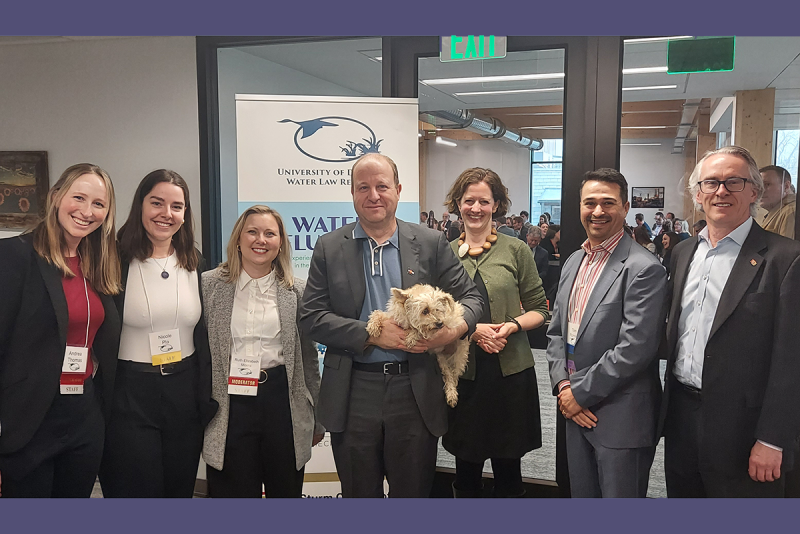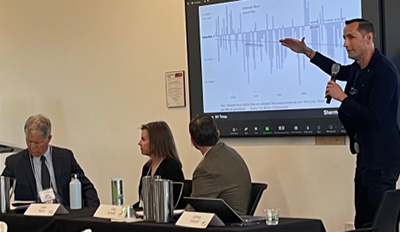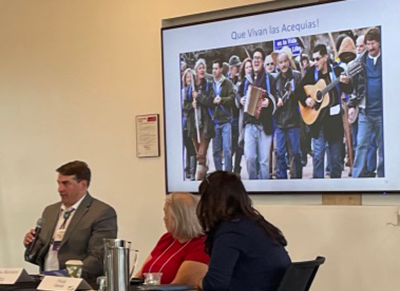Water Law Review Symposium Explores Innovative Solutions to Share a Scarce Resource

Governor Jared Polis holds first dog Gia (c). With (l-r) WLR members Andrea Thomas, Nicole Pla, Ruth Elizabeth Morris, and Provost Mary Clark, Professor Tom Romero and Dean Bruce Smith.
For more than 25 years, the student-edited Water Law Review at the University of Denver Strum College of Law has published information for lawyers, policymakers, students, and water practitioners on developing issues in water law. Since 2008, the Water Law Review has organized an annual symposium to bring all those stakeholders together to discuss the most current and relevant topics in the field. This year’s all-day event was held on April 14th and was hosted by Symposium Editors Ruth Elizabeth Morris and Andrea Thomas. It featured discussions that ranged from innovative solutions to water problems in the mountain west to equitable access by diverse populations to both rivers themselves and to the water court system. Speakers included practicing attorneys, legal scholars, community and government stakeholders, and Colorado Governor Jared Polis.
In an introduction that provided an overview of many of the issues that were covered throughout the day, Russ Sands of the Colorado Water Conservation Board talked the audience through the recently updated Colorado Water Plan and the role of the board in providing grants and coordination to support the plan’s initiatives. The plan has evolved since its introduction in 2015 to respond to changing conditions and is a valuable tool for understanding the current and proposed future actions being undertaken to respond to water resource challenges and the legal framework that surrounds those actions in Colorado.
The first panel discussion of the day, “Innovative Solutions for Water Problems in the Rocky Mountain West,” included James Eklund, a practicing attorney at Sherman & Howard and working rancher on his family’s homestead in western Colorado. Eklund’s opening remarks paid tribute to the late Colorado Supreme Court Justice Gregory J. Hobbs, Jr., whose 1997 “Colorado Water Law: An Historical Overview” was the first article ever published in the Water Law Review, and which continues to provide a fascinating history of the legal doctrines governing water in Colorado.
Also on the panel was Kate Ryan, senior staff attorney for the Colorado Water Trust, who suggested a (purely hypothetical for now) special district—like the Regional Transportation District (RTD) but for water access rather than public transportation—that would collect a modest property tax to buy water rights and then put them to use for taxpayers in the district. As Ryan writes in a blog post describing this idea, “[t]he beauty of a special district is that we are all in this together – we pay together, and we prosper together.” Dan Arnold, in-house counsel at Denver Water, described examples of innovative solutions to water challenges that are already in existence: the Denver Water headquarters building’s in-house gray water recycling system, Bluff Lake Nature Center (the former Stapleton Airport site), and the CSU Spur Hydro at the National Western Center.
In a brief address, Governor Polis (who had first pup Gia in tow), echoed his State of the State address, asking, “Who do we want Colorado to be when we turn 150 years old, just three years from now? When it comes to water, that question is particularly urgent.” Polis also reiterated another recent theme of his administration — that “housing policy is water policy…housing policy is climate policy,” and described the ways that acting now to address housing affordability and sustainability can also help mitigate the water crisis.
Without exception, the day’s panels reflected the immediacy of the topic, in particular a discussion involving a live dispute that will be heard before the Colorado Supreme Court in May. The case, Hill v. Warsewa, addresses the issue of whether an individual citizen has standing to assert a right of access to a Colorado river for the purpose of fishing, if that river flows across private property. The case revolves around questions that are unique to Colorado water law and illustrate the ways in which it differs from water law that governs much of the rest of the country. On behalf of the citizen plaintiff, CU Boulder Law Professor Mark Squillace advocated for the existence of such a right, while attorneys David Hayes and Steven Leonhardt argued that the Colorado constitution never envisioned one.
Denver Law Assistant Professor Wyatt Sassman was struck by a larger question than the disagreement between the citizen litigants: why isn’t the state defending its rights? “[The defendant’s] position, if accepted by the Colorado Supreme Court, would isolate Colorado as the only state in the nation to disclaim centuries of American law around navigable rivers—and do to so, at least from my perspective, without saying a single word on the issue.”
In remarks that would set the stage for the final panel of the day, Tom Romero introduced a theme that holds great urgency for members of acequia communities in the southwest: justice. Romero, a faculty advisor to the Water Law Review and associate professor of law and affiliated faculty with the University of Denver Department of History, said that water law and policy should strive to create three primary outcomes: certainty, equity, and justice for our most vulnerable populations.
Among the communities that rely on Rocky Mountain rivers are those who live along acequias—irrigation channels that are both cultural and legal institutions in Colorado and New Mexico. The Acequia Assistance Project at the University of Colorado Boulder, directed by CU Boulder Law School Faculty Fellow Gregor MacGregor, is “a pro bono effort to provide Hispano irrigators in southern Colorado with legal services related to their land, water rights, and businesses.” A member of the acequia community of San Francisco in San Luis, Colorado, Junita Martinez, thanked the students and attorneys who have been providing legal assistance through this project—encouraging both them and members of her community to be welcoming of each other.
Finally, Paula Garcia, who is executive director of the New Mexico Acequia Association, provided a reminder of the importance of language in being culturally competent: “I don’t like when acequia is translated to ‘ditch’…an acequia is an acequia. Not only is it the waterway or conveyance, the acequia is the people. In Spanish, I would say, ‘Yo pertenezco a la acequia’…I belong to the acequia. I belong to a community, I don’t belong to a ditch.” Garcia also emphasized the importance of attorneys in creating water equity for acequias through adjudication of water rights, providing legal counsel in water transfer decisions and protests, and in challenging preliminary approvals of water leases in court.
The acequias, like much of Colorado and the southwest, face challenges of water scarcity exacerbated by climate change, drought, wildfires, and competing interests, a cycle that Russ Sands of the CWCB explained at the beginning of the day. Considering the century-long trend of decline in the availability of Colorado River water for use throughout Colorado and the southwest, the new podcast Parched from Colorado Public Radio asks, "exactly how screwed are we?" As if in response, Sands concluded that “there's enough good news that we should not be without hope, and too much bad news to be complacent.” The University of Denver Water Law Review continues to set a course for navigating these challenges in a time of uncertainty.





